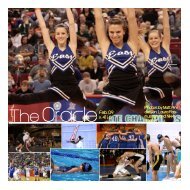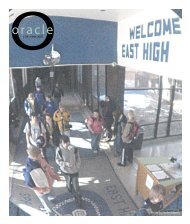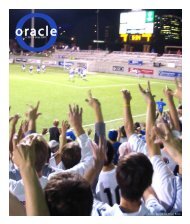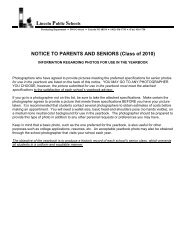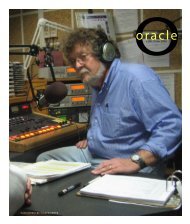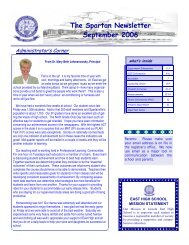January 2006 - Lincoln East High School - Lincoln Public Schools
January 2006 - Lincoln East High School - Lincoln Public Schools
January 2006 - Lincoln East High School - Lincoln Public Schools
Create successful ePaper yourself
Turn your PDF publications into a flip-book with our unique Google optimized e-Paper software.
Oracle looking inat educationWinter Special <strong>2006</strong>
<strong>East</strong> <strong>High</strong> Social Studies Michael Baker is at the center of an academic storm. Baker’sunconventional teaching method, dubbed “reverse-chronological,” was recently banned by the<strong>Lincoln</strong> <strong>Public</strong> <strong>School</strong>s. The controversy has stirred up a district-wide discussion about freedomin the classroom. Read more on page 8 . (Photo by Susanna Webb)
There are at least two sides toevery story. Education is no exception.Whether a student or acommunity member, everyonehas an opinion about education.This special Oracle provides an indepthlook at a complex issue --from inside and out.INSIDER VIEWS:Pages 4-5/Inside: From math to music, alook at how different students get the jobdone.Pages 6-7/Inside: The inside scoop on therules that run the school.Page 8/Inside: Teachers’ views on the fightfor academic freedom.OUTSIDER VIEWS:Pages 2-3/Outside: Students and schoolsstruggle to make the grade.Pages 4-5/Outside: Analysis of the upcoming bond election as LPS attemptsto pay its bills.Pages 6-7/Outside: The ongoing debateover how schools prepare students forthe real world.Photos by Erin Brown, Susanna Webb, and Shuqiao Song.Page design Jake Meador.Front and Back cover art by Lindsay GraefPage 8/Outside: The school district’s perspective on the great freedom debate.
The spectrum of students studying styles_BJ ValenteErin CarrCara MorgensonHobbies: Reading, watching movies, and hanging out with friendsand family.Things come easily to you: Relating to ideas and looking at differentperspectivesExtracurriculars:Horseback riding,Ecology Club, FilmFavorite classes:Anatomy/physiology, yearbook,and photographyWhat kinds of things comeeasily to you? Anything visualPost high-school plans:UCLA for fi lm directing.How do you incorporateyour style of intelligence intoyour life? It’s important to knowExtracurriculars:Swimming, soccer, andthe drum line.Things that comeeasily: Subjects with numaboutthe ecology around you.My mentality infl uences decisions,because it’s importantto be environmentally consciousof our actions.Favorite Class: AP Lang with Dr. Cognard.Post high-school career: Medicine, history, or English. I havea wide spectrum of choices.How do you incorporate your style of intelligenceinto your life? I’m conscious of my grades, and I don’tthink higher of myself than anyone. Ijust do the best job I can.nature-smartword-smartAlex ChurchillStaff ReporterExtracurriculars: Speech, Science Quiz Bowl, and math competitions.Are there any things that come easily to you? Anything systematic.Post high-school plans: West coast for college with a double major in mathand an engineering fi eld.How is your intelligence style incorporated into your life? It’s easier tosee consequences of what I’m about to do.number-smartpicture-smartCassieJonesHobbies: Taking pictures,doing photography,going to concerts, and seeingmovies.Things that come easily: Historyor an art class.Favorite class: PhotographyPost high-school plans: UNLor UNO majoring in art or arthistory.How do you incorporateyour style of intelligence intoyour life? For me, commonsense is more importantthan book smarts. What’sreal and applicable to lifeis important.Katy BurnettHobbies: Reading,writing, theatre, ecologyclub, and learning languagesThings that come easily:Philosophy and connectingideasFavorite Class: A classself-smartwhere we would read classics anddiscuss themPost high-school plans: Universityof Chicago majoring in comparativelanguage, linguistics, Middle <strong>East</strong>ernstudies, or chemistry are my possibilities.I defi nitely want to go to gradschool.How do you incorporateyour style of intelligence intoyour life? I use what I learnto analyze what goes on inmy life and in those aroundme.people-smartAngela Finn4 inside Winter Special <strong>2006</strong>pExtracurriculars: Athletic training, yearbook,and student council.Things that come easily: Understanding differentviewpoints.Favorite Class: Student council; I like to interact withpeople and taking charge of different events and activitiesPost high-school plans: UNL starting out in athletic trainingand physical therapy school for graduate.How do you incorporate your style of intelligence into yourlife? My parents raised me with the idea of it’s not what you knowit’s who you know.Page design by Kari Tietjen, graphic by Jake Meadormusic-smartKirk Brownbody-smartHobbies: Swing choir, soccer, bible study, and a garageband called Dorkus MalorkusFavorite Class: Calculus D with ButlerNic Genrichbers, math.F a v o r i t e c l a s s :MathPost high-school plans:Biological sciences and thendentistry.How do you incorporateyour style of intelligence intoyour life? My emotions areevident, I don’t hold them in.I try to be very honest abouthow I’m feeling. And becauseof my sports I have to know myphysical limits.What comes easily? Calculus, learning new choreography,and music.Post high-school plans: I’m looking forward to doing a musicand philosophy double majorHow do you incorporate your style of intelligence into your life?Music is a way to see beauty in things. It uplifts and creates a positiveattitude for how I see things.Photos by Erin Brown and Susanna Webb.
Focus schools cater to students’ specific needs_Darja DobermannStaff Reporter“For some students it’s good to offer a choice,” said DickSpearman, Administrative Assistant for Instruction of <strong>Lincoln</strong> <strong>Public</strong><strong>School</strong>s. The choices Spearman were referring to were none otherthan the LPS Focus <strong>School</strong>s. There are three main focus schools andArts & Humanitiesanother in the works. LPS currently offers focus programs in science,arts and humanities, and information technology. A program forentrepreneurship is on its way. Each program focuses on its coreemphasis while still incorporating regular classes.Info Tech Focus ProgramThe Arts and Humanities Focus Program often elicits stereotypes of beatniksin berets holed up in art studios. However, the program provides almost as muchtime for general courses as it does for art. In a typical week, students spend fourdays in all-day classes called sectionals. On Thursdays, the students have studio, atwhich time they watch movies or listen to lectures from local artists. These studiodays are designed to broaden the student’s horizons and expose them to real lifeartists that have made it big doing what they love.“My first year, a mime came. It was probably the coolestthing I’ve ever seen in my life,”said senior Jessie Dittmer. Dittmeralso enjoys the communityof creative studentswhich welcomes diversity withopen arms. “Everyone thereis nice, and we all get alongbecause we have similarinterests,” said Dittmer.The Information Technology Focus Program (ITFP) is unique among LPSFocus programs. ITFP runs for two hours in the morning, rather than five hours like itsfellows. It covers solely technology, whereas the others survey a variety of topics.Topics taught include advanced web page design, hypertext markup language(html – the basic web-page writing code), graphics, and programs. Projects includemaking an educational web page.Students gain hands-on experience through projects, like making an educationalweb page. “Twenty-five percent of the time is spent making it and the restis fixing the glitches,” said Todd Brown, a sophomoreat <strong>East</strong> and ITFP. Through ITFP, students gain real-lifeexperience with programming languages. On adaily basis, they work with everything from visuallybasedto highly advanced languages, such asC++. Students are also allowed the opportunityto create new languages.“Half the time we have to come upwith our own language to make our projectswork,” said Brown. The ITFP programis a valuable asset to highly-motivatedstudents interested in technology.Science Focus ProgramPerhaps the most well-known focusprogram is the “Zoo <strong>School</strong>.” A commonmisconception about the Science FocusProgram is that its classes only coverthe studies of science and animals. Thisis far from true. The program offer studentsopportunities to learn inside andoutside classrooms while taking moreresponsibility for their educations. TheZoo <strong>School</strong> is open to all grades, thoughit requires a high level of motivation andArts and Humanities studentJessie Ditmer studies herfilm. (Photo provided byteacher recommendations.Once accepted, studentsintegrate the program intotheir daily schedule.Generally studentsattend Zoo <strong>School</strong>during the afternoon.One notabledifferencebetweent h eITFP student Todd Brown at his computer.(Photo provided by LPS)program and traditional school is “focusdays,” when students listen to guestspeak- ers, usually researchers orp r o - fessors, and attend fieldand research trips.“It provides theopportunity to learnfrom someone whohas thehandsonexperience,” said Mitch Paine, a juniorat <strong>East</strong> and a student of the ScienceFocus Program. Paine decided earlyon that he wanted to join the program.“I first heard about it in the first gradewhen I read an article in the <strong>Lincoln</strong>Journal Star and decided from then onthat I wanted to go to Zoo <strong>School</strong>,” saidPaine. In the long run Paine is looking ata career in marine biology, so the Zoo<strong>School</strong> provides the perfect opportunityto put him ahead of the game.Science Program students Mitch Paine and Carrie Wencelenjoy class at Zoo <strong>School</strong>. (Photo provided by LPS)Spartans Speak OutCompiled by Kelli Blacketer and Peter PantherHow can <strong>East</strong> <strong>High</strong> improve how it deals with different learning disabilities?“We challenge ourselves to helpall students learn. It means adaptingthe way material is presentedand helping students gain theconfidence to try somethingnew.”–Brenda Leggiadro,counselor“More paraeducators, becauseparas help the studentsto understand the materialbetter.”“I like the way the studentsget extra help in their regularclasses with the co-teachers.The co-teacher adapts the assignmentsto the students.”– Sabrina Knuth, SPED-Terri Geir-Brindell,parateacherWinter Special <strong>2006</strong> inside 5
Helping or hurting?Tasha Roth-Staff ReporterMore than half of the Spartan students and teachers surveyed don’t carefor the planners. So why are they here? Administrator Gene Thompson said plannersimprove grades and help students organize better.“They create a better communication between home and school,” saidThompson. Students can write down their assignments and their parents can seewhat allthey need to do, and what tests to study for.” So what if thestudent doesn’t write down assignments and parents don’task? Then how does the planner improve anything?Freshman Dakota Othrengren believes thatmost students only use their planners for passes.“ I never use my planner unless it’s to get out of class,”he said. “I only have written in it twice.”Senior Hudson Gardner thinks planners are a wasteof the school’s money.“ This school practices the Don’t Ask Don’t Tellprogram. Teachers assume you’re on task and doingsomething you’re supposed to do, so they don’t ask forplanners,” said Gardner. “ I don’t need my planner,I remember appointments and assignments,so I only use my planner for passes.”Students aren’t the only ones disliking thesystem. Business teacher Laurie Fraser doesn’t always utilize them.“When they go to get a drink or go to the cafeteria, I don’t makethem use their planners, but if they want to go to the bathroom or thelibrary they have to have a pass,” said Fraser. She does see some studentsvoluntarily using planners. “I think planners help students organize andimprove grades,” said Fraser.Despite Gardner’s claim that planners are a waste of schoolfunds, their cost is nominal. “ We haven’t spent any more money onplanners. The cost is equal to the student handbooks that are includedin the planners,” said Thompson. “We are just trying to make things easierto remember assignments and tests and to make communication easierat home.”PlannerProblemsTesting out the systemMelanie Fichthorn-Staff Reporter6 Inside Winter Special <strong>2006</strong>Beware anything blue, white, and rectangular! You have been cast intothe evil shadow of the planner. Planners have been part of <strong>East</strong> students’lives for two years. From using the bathroom, hallway, or library, everyonesupposedly needs a planner. Do students really need to have a planner withthem at all times, though? It would seem that the answer is no. Who needsa planner when teachers don’t ask for them? A student could wander thehalls at whim and not be stopped by anyone. In fact, that’s exactly whatI did for an hour. I wandered up and down the hallways of <strong>East</strong> <strong>High</strong> andwasn’t stopped once.On the fi rst fl oor, I waved to fi ve teachers, three custodians, and thetwo people guarding the bathrooms. I even made small talk with the teacherguarding the front doors. No one asked for my planner. After stopping by theart wing to say hi to a friend, and walking around the lunchroom for a bit, Iproceeded to the second fl oor. I got the same result there. I walked aroundthe halls staring at posters, and smiled to two teachers and a few students sittingin the halls. There was a lab going on in the hallway, so I stopped behindthe supervising teacher and watched. I swear I’d just turned invisible, becauseshe didn’t even ask me what I was doing there, let alone for my planner.After not being stopped in the basement, I came to the followingconclusion: planners are, indeed, useless. Why do we have them if no oneis going to enforce the rules concerning them? Perhaps they are a waste ofmoney.So the blue and white fl ags of Greece, Finland, and Honduras mustlay low for awhile, until some one decides to rid <strong>East</strong> <strong>High</strong> of planners -- or atleast until they are printed in a different color.Design By: Jake Meador & Jetz JacobsonPhotos By: Susanna Webb
As <strong>Lincoln</strong> <strong>Public</strong> <strong>School</strong>s attempts to regulateeducation, Michael Baker find the district iscramping his teaching style. Below, learnhow <strong>East</strong> <strong>High</strong> teachers fight for academicfreedom.A murky sign hangs at the entrance of Michael Baker’s classroom. It reads:Room 101. A reference to the book “1984”, Room 101 is a dreaded place ofgruesome torture and excruciating pain. It is a place where traitors are imprisonedand taught how to comply with the rules of their superiors. It is incrediblyironic that this sign hangs at Baker’s door.One glance inside Baker’s classroom is enough to convince a visitor thatBaker is a freedom fighter. Just recently, Baker has had to fight for his ownfreedom inhisto-Michael Bakerthe classroom. For the last five years, Baker has taughtry using what he calls the yo-yo method. His studentsdon’t learn history chronologically, but rather in abounce-back sort of way. Students study presentdayissues first, then travel back in time and relatethat history to present day, going back a little furtherevery unit. This year, though, Baker has beenforced to discontinue the teaching style.“District officials said they felt it wasn’tconsistent with the curriculum,” said Baker. Bakerhas appealed their claim and expects to heara fi-nal decision soon to see if the yo-yo method will beallowedsecond semester.Baker is not the only teacher who has had to change teachingmethods. For 25 years, Spanish teacher Steve Pierce has used politicalcontroversy in the news as a means of helping students speak Spanish.“I would argue one side of a topic and I’d encourage the class toargue back at me,” he said. “It was great because the students were moreinvolved and so they had better comprehension.” Pierce also noted thatstudents’ grades improved as they spoke more.But Pierce has had to put an end to using controversy as a meansof encouraging students to speak. District policy specifically prohibits ateacher from taking any side in a controversy. “I think [the old way] wasmore beneficial because it engaged the students to learn,” said Pierce.“When students speak about something that’s of interest of them they’remore willing to actively participate and learn.”While one of LPS’s ongoing goals is critical thinking in the classroom,some people are concerned that the district has restricted Baker and Piercefrom accomplishing just that. Baker said he feels that being restricted in histeaching not only prevents students from thinking critically, but keeps themfrom learning effectively also.“Different students learn in different ways. [Yo-yo history] gives bothholistic and linear perspectives on history,” said Baker.A learning-styles survey given to Baker’s students showed a wide rangein results, which supports his claim. Baker said he feels that being denied hisfreedom in the classroom has also inconvenienced his students.“The old way had very positive feedback. It gave the students a greaterunderstanding of their surroundings and had more meaning in their own lives,”said Baker. “Saying there is only one way to teach history is against reason.”Baker recently started a radio program for people to voice their opinionson education issues. The show airs Wednesdays at 6:30 on K2VM 89.3FM. Whilethe show gives him a larger audience than he has in his classroom, Baker acknowledgesthat the real work to be done is at school.“In the classroom teachers should be allowed as much freedom as necessary,as long as it’s within professional and moral bounds,” said Baker. “Thereneeds to exist a greater trust between the district and its teachers. Weshould be allowed to teach in a creative fashion.”Story by Danny JablonskiPhoto by Susanna WebbFreedomAcademicMaBy definitionthan one peteacher Micpolicy, AssoMoore stoodthAs tensions roseHistory teacher, Michlyn Moore, the LPS Asdistrict administratorto teach history using“This is a processummer, before I watalking with people acurriculum for monthAs Associate Sujob to implement theand officials. There adecide upon these cis through “formal curthe teachers from atent and teaching mit was in one of thesechronological curricuBaker’s teachintern.“I start at the prare affecting kids todthem in their sense ofThough Baker’slogical requirement.could cause problemsemester or transferreThe Journal-StarNov. 4 paper. Many cthe article. At least ondecision to deny Bakfor the curriculum,” oteacher Michael Baktheir concerns, wondclass what they think,Academic FreeMoshman also chimehe said.Despite the conits end.“This is not a cosystem,” said Moore.studies where the teclasses.”The district’s formpossible that the distriing of history in <strong>Lincoln</strong>history itself may not b8 inside
Vocational Education:Getting the job doneSalome Vilojen_ Staff WriterAs we all know, differentstudents have different goalsfor their education. Some of uswant to go to graduate school,some want a two-year degree,and some just want to graduatehigh school. No matter what ouracademic aspirations, nearly allof us know that one day, we willhave to decide on a career thatmay last the rest of our workinglives. Now, most people in highschool don’t have a clear ideaof where they’re going to end up,but some students not only knowtheir exact career choice, but arealready actively pursuing them--inthe form of vocational studies.Vocational studies aredefi ned as anything relating to,providing, or undergoing trainingin a special skill to be pursued ina trade. They provide students the opportunity to gainin depth, focused education in a specifi c career area.Vocational training has traditionally been industrialtech-type classes, giving training for mechanics andwoodworking. Recently, however, vocational traininghas expanded to include programs such as the InformationTech Focus Program and the EntrepreneurshipFocus Program, which offer career-oriented curriculumin the areas of technology and business.Along with some new programs, vocationalstudies seem to be developing a new role in education.Whereas previously viewed as a way to avoid“real” school, vocational training today is seen less asan escape route and more as an alternative. With allthe new technology these students are required toknow, the courses become increasingly challenging.Vocational studies, “are no longer a dumping groundfor kids who don’t want to be in school,” says GaryWilliams, an assistant principal here at <strong>East</strong> <strong>High</strong>.The increased technology in vocational studieshelps these students in other ways as well, requiringbackground courses in math and science in order tofully understand the subject matter. These backgroundcourses expose the students to some other courses, soif they ever do decide to head in another direction,Times are changing. Jobs are now requiringhigher levels of education. Computerinnovation is transforming the world as weknow it. With the new technology come newjobs -- and new education requirements.Here is a list of jobs predicted to be hot picksfor the next decade, along with educationalexpectations to accompany such careerdecisions.Eric Schwartz, Gordan Miller, and Rachel Sydzyik working on a project (Photo by ShuqiaoSong).they won’t be completely lost. “It’s important to atleast know what’s going on outside of your focus area,”says Bartels-Eiland, “to gain some perspective on otherareas as well.”The extreme focus of vocational studies maybe their biggest setback. And while the LPS programsdo require vocational students to take courses inmath and English, the programs are unable to givethe focused education the students are looking forand provide the broad-range education receivedin a conventional high school. If these students everdecide to pursue another career, they may be behindclassmates. For this reason, vocational studies are onlypractical for students whose hearts are set in a certaindirection.Vocational studies aren’t for everyone, butstudents who are set on their future career do gainsome advantages from having a vocational-basededucation.“These are students who come in alreadyknowing a lot about the subject matter,” says KayeBartels-Eiland, Admissions Representative for the <strong>Lincoln</strong>Southeast Community College. “They have had thehands-on experience and are ready to expand on thatknowledge.”Professional Degree- Physicians- VeterinariansDoctoral Degree- Postsecondary Teachers- BiochemistsBachelor’s Degree- Physician Assistant- Computer Software Engineer<strong>East</strong> <strong>High</strong>Voc. Ed classesthrough the agesBest of the 60/70s:ArchitectureIntro to ComputersStenographyClerical Offi ce PracticeBest of the 80s:AeroscienceCivil DraftingAuto EngineAdvanced ClothingOffi ce ProceduresPersonal BookkeepingBest of the 90s:TV JournalismStagecraftConsumer MathematicsPromotional StragegiesSmall Engines & Motorcycles<strong>High</strong>er education quickly becoming the standard6 outside Winter Special <strong>2006</strong>Associate Degree- Dental hygienists- Forensic Science TechniciansPostsecondary Vocational school- Gaming dealers- Fitness trainers and aerobics instructorsLong-term on-the-job training-Fire fighters_Compiled by Kayla Knott_Compiled by William Chen
<strong>East</strong> <strong>High</strong>Liberal Arts classesthrough the agesBest of the 60/70’s:Greco-Roman HistoryModern ProblemsSpace ScienceGeo-PoliticsLinguisticsBest of the 80s:Gothic NovelsRoaring TwentiesMyth and LegendDick and Jane DilemmaWordPower: Greek RootsWord Power: Latin RootsBest of the 90s:Finite MathematicsProblem SolvingBotanyRussianAP Macroeconomics_Compiled by William ChenLiberal Arts:A broad-based approach to educationSusanna Webb, Rhea Cruz, and Katie Streeter practicing “The Odd Couple” (Photo by:Shuqiao Song)Salome Vilojen_ Staff WriterFor many students at <strong>East</strong>, a variety of courses ina broad range of areas go hand in hand with our ideaof education, making ours a very liberal arts education.Liberal arts education is defi ned as, “the study of thehumanities, history, foreign languages, social sciences,mathematics, and natural sciences. Study of the liberalarts and humanities prepares students to developgeneral knowledge and reasoning ability rather thanspecifi c skills,” according to The College Board.“<strong>East</strong> has a very ‘liberal arts’feel to it, “said Gary Williams, a viceprincipal here at <strong>East</strong>, “many kidstake high level core classes, but stillenjoy taking things like music, art, andcomputer courses, they want variety,and many just don’t feel ready to bepigeon-holed yet.”Though vocational studies mayget you ahead of the game in a particularfi eld, some students just aren’tready to commit to a particular fi eld.“[students in vocational programs] willcertainly be more ready to move intotraining, but high school students arestill young, and their minds are changing:the last thing you want is a studentto change their mind and be left withno options,” said Williams.A broad education allows studentsto explore all the options theirworld has to offer. Liberal arts educationallows students to defi ne theareas they’re good at, helping themdiscover new talents and interests.“<strong>High</strong> school is like a relay station.We bring students to a certainlevel and prepare them for the nextone. We need to prepare students forwhatever that next level is for themindividually,” Williams says. For themajority of students, this means givingthem time to explore different areas ineducation, not only to refi ne interests,but to broaden perspectives.Requiring students to take classeslike woodworking, along with coreclasses, allows them to meet, associate with, and understanddifferent people. “Requiring a kid to take anapplied and fi ne art allows the student to be part ofsociety. It allows them to appreciate areas they willhave liminted access to when older. It gives studentsexperiences are human beings, not just as students,”says Dr. Marilyn Moore, Associate Superintendent forInstruction for the LPS District.Perhaps the idea of a liberal arts education is bestexplained in a quote by John Goodlad: “<strong>School</strong>s helpstudents to join the human conversation.”Some college and high-school dropouts find successDespite what your high school counselortells you, you can actually be successfulwithout a college degree. Heck, somepeople have even succeeded without ahigh school diploma. Granted, the few whodo succeed without donning the cap andgown are usually geniuses. Or billionaires.Or extremely well-connected. Here is a listof people who beat the odds and went onto make something of themselves, withoutthe help of a formal education.Vidal Sassoon - Hair stylistDropped out of high schoolGeorge <strong>East</strong>man - Founder of KodakDropped out of high schoolPeter Jennings - ABC Evening news anchorDropped out of high schoolSteve Jobs - Apple CEODropped out of Reed College,Portland ORBill Gates - Microsoft CEODropped out of HarvardH Wayne Huizenga - Owner of theMiami Dolphins and founder ofBlockbusterDropped out of Calvin College,Grand Rapids, MI_Compiled by Kayla KnottWinter Special <strong>2006</strong> outside 7
Bond Issue Q&A with Kathy Danek and Peter KattKathy DanekPresident, <strong>Lincoln</strong> <strong>Public</strong> <strong>School</strong>s Board of EducationPeter KattAttorney at Law and former <strong>School</strong> Board MemberDo you think the Bond Issue will pass? I have great confidence in the wisdom of<strong>Lincoln</strong> voters, and I think this bond issue has a great message -- putting kids andteachers in better facilities without raising the tax rate.Why haven’t other bond issues passed before? <strong>School</strong> bond issues have a greattrack record in <strong>Lincoln</strong>. Just one was defeated (over 15 years ago) but more than$150 million in school construction bonds have been approved (and well used)since that time.How is this bond election different? We can address these critical needs of<strong>Lincoln</strong>’s schools without an increase in the tax rate. This bond issue came as aculmination of a nine-month citizen review of our facility needs.Why is the bond issue being put to a vote? We cannot issue bonds without avote of the citizens. We must ask their permission to reallocate those funds.Do you think the bond issue will pass? I trust the taxpayers will make an informeddecision and defeat the bond issue.Why haven’t other bond issues passed before? The taxpayers did not trust theBoard of Education with either needing or spending the amount of money beingrequested from the taxpayers.How is this bond election different? There is no difference. Those questions existin this election. The massive dollar amount ($250 million) is a record and weare going to pay it back over 30 rather than the more typical 20 years, which isdifferent.What is the biggest problem to overcome? The biggest problem is for the votersto learn enough about the bond election to make an informed decision as towhether they should vote for or against the bonds.What is the biggest problem to overcome? Engaging eachand every voter, educating them and inspiring them to vote.Who is most benefited if this issue is passed? The students willbenefit from a learning environment that enriches studentachievement and our staff will have better working conditions.Who is most harmed? If the bond issue fails, we will continueto provide our children with an excellent education. But it willnot alleviate the significant needs our school district is facing.How do you get people to understand this issue? The schooldistrict has developed a brochure outlining the facts ofthe bond issue and facility needs. A broad based citizenscampaign is leading community efforts to inform voters. The<strong>School</strong> Board will hold public information meetings throughoutthe community and will speak to <strong>Lincoln</strong> citizens.How have election officials handled this election? Theelection commissioner has been great in shouldering hisresponsibilities-–as usual. He has been very responsive in presenting the facts, answeringquestions, and will prepare this election with the expertise and excellence <strong>Lincoln</strong>has come to expect.What will be sacrificed if the bond issue passes? Because these needs can bemet by using the current tax rate, I don’t envision sacrifices if it passes.What alternatives, if any, are there? We are using the alternatives today.Students attend classes in buildings where the heating systems might have oneclassroom at 55 degrees and another at 90. Classes are bigger in crowded areas.Many portables line the building property of these schools.What do you think of 17-year-olds voting in this election? I am a strongadvocate of voter participation. This is a great opportunity for any citizen who willbe 18 by the November <strong>2006</strong> election to vote in this February 14 election.<strong>Lincoln</strong>ites Speak OutGet Out the Vote!If your 18th birthday isbefore November 7th,<strong>2006</strong>, you can vote inthe February 14th bondelection. <strong>High</strong> schoolsacross <strong>Lincoln</strong> offer voterregistration in <strong>January</strong>.On <strong>January</strong> 27th, thedeadline for registeringfor this election, <strong>Lincoln</strong><strong>East</strong> students will be ableto register at school.Compiled by Jessica Lane. Photos by Shuqiao Song.Who is most benefited if this issue is passed? I believe the<strong>School</strong> Board since by adding 2,250 unnecessary elementarystudent classroom spaces they save themselves the pain ofneeding to make difficult boundary changes to make betteruse of the existing schools.Who is most harmed? No one is harmed unless the taxes ontheir home or other property increase so much that they canno longer continue to afford to live in <strong>Lincoln</strong>.How do you get people to understand this issue? Goodquestion, I do not have a good answer.How have election officials handled this election? Poorly. Thiselection could have been held entirely by mail at a lower costand with a greater turnout than going to the polls. Why don’tyou ask the election commissioner why he decided to makevoting in this election more difficult than it needed to be.What will be sacrificed if the bond issue passes? I am notaware of any current supporters or opponents of the bondthat have any sacrificial rituals, human, animal or otherwise that they will publiclypractice if the bond issue passes.What alternatives, if any, are there? Build schools for parochial schools. The costwould be less than one-half of public schools. Also, the bond issue could be inan amount we need, say $100 million or so, rather than the proposed recordbreaker.What do you think of 17-year-olds voting in this election? I suspect they will investthe same amount of time and effort in becoming informed voters on this issueas adult voters. Accordingly, I would welcome them to the minority today thatparticipates in any manner in the democratic process.Are you in favor of the LPS bond issue? Why or why not?“I am in favor of the bondbut not in favor of a specialelection. That’s frivolous.I’m not in favor of anyspecial election unless it’s acritical issue.”-George Bray, retired“Yes, I agree with all of it.”--Dr. Marilyn Grady, UNLprofessor“I’m in big support of it. Thiswill really help things getdone around our schools.”--Sharon Tenopin, teacher4 outside Winter Special <strong>2006</strong>
The name’s bond, school bondSarah Melecki_ Staff ReporterLPS students, staff, and parents spend a greatdeal of time in school buildings. These buildings havebecome the subject of an upcoming bond issue. Aplan has been proposed to improve the conditionof almost all of the 53 current schools, including <strong>East</strong><strong>High</strong>. The $250 million dollar bond will pay for theimprovements.According to a community task force appointedby Superintendent Susan Gourley, many schoolsneed updated heating and air conditioning systems.Some schools need air conditioning for the fi rst time.Many schools are running out of room and need additions.Others rely heavily upon the use of portablesas classrooms and need a more permanent solution.Other schools need to be renovated, either in part orin whole, because of wear and tear that comes withage and heavy use.Dennis Van Horn, Associate Superintendent forBusiness Affairs, explained the proposed changes to<strong>East</strong>.“New air conditioning and heating will be installed.An addition will be added to the IndustrialTechnology department because some of the currentspace the department utilizes will be turned overto the Performing Arts department. Also, a generalupdate of the whole building will be conducted,”said Van Horn.The plan for updating the schools is supportedby many of <strong>Lincoln</strong>’s citizens. <strong>East</strong> <strong>High</strong> <strong>School</strong> artteacher Larry Buller is one in favor of the bond issue.“I think I’ll support it because the last severalyears, the money has been so tight that they are behindon all of the maintenance,” said Buller.In order to make informed decisions, voters needto know the details of the proposal. On February 14,<strong>2006</strong>, a special election will be held in <strong>Lincoln</strong>. The voterswill not choose whether or not the plan to improveLPS buildings should be carried out. Instead, voters willbe deciding whether or not LPS can sell bonds, whichare much like loans that citizens of <strong>Lincoln</strong> give to LPS.Those bonds will be used to help fund the projectsproposed under the current plan.Other money to fund the projects will come fromthe LPS budget. By selling bonds, the school board hasvowed to not raise the current tax levy to fund theprojects. The bonds, which can be cashed in after acertain number of years by the citizens who choose tobuy them, will be paid off with money that is currentlyin a piece of the budget called the Indoor Air Qualityfund. The fund currently pays to put air conditioningand new heating systems in <strong>Lincoln</strong> schools that needthem. However, the money will no longer be neededto fund installation of air conditioning and heatingbecause that is included in the plan that LPS has putSpartans Speak Outtogether. That money will be put towards paying offbonds, instead.The bond election is fairly complicated becauseof its economics. Joe Nigro, President of the <strong>East</strong> ParentAdvisory Council, understands the details of theelection fairly well.“I think it’s important for people to understandthat taxes won’t go up because of this bond election,”said Nigro.Like anything taken to the polls, the issue facessome opposition. Most of the opposition says that<strong>Lincoln</strong> <strong>Public</strong> <strong>School</strong>s offi cials are trying to get theproposal passed much too quickly.Some <strong>Lincoln</strong> Independent Business AssociationCompiled by Jessica Lane. Photos by Shuqiao Song.Left untouched, <strong>Lincoln</strong>’s older schools could look like this someday(Photo Illustration by Jake Meador).members are worried about how quickly the electionis coming up.“One of the biggest problems we face in <strong>Lincoln</strong>is a lack of confi dence in how our tax dollars are beingspent. That’s where I have a lot of anxiety about havingthis election so quickly,” said one LIBA member.Although the election won’t raise taxes, theproposed plan will use some money that LPS currentlyhas collected from taxes. Therefore, taxpayers areinterested in how LPS is spending their money. Somepeople think that <strong>Lincoln</strong> <strong>Public</strong> <strong>School</strong>s would bewise to postpone the election until May <strong>2006</strong> to allowmore time to educate the public on how money willbe spent.Doug Evans, an LPS school board member, opposeshaving the election in February.“The problem is this,” said Evans. “If people believeyou can get something from nothing, the bondproposal will pass. If not, school board members willlook like a bunch of crooks and in my experience,a minimum of two to three months is needed to geta regulation passed.”Evans is referring to the idea of renovatingschools without raising taxes, which many are skepticalof. However, despite his anxieties, Evans is onrecord as voting for having the bond election inFebruary.Beyond spending their school days in LPSbuildings, students have much at stake in the bondproposal. First of all, anyone who is going to be 18on or before November 7, <strong>2006</strong>, is allowed to votein the bond election on February 14. No, that’s nota typo. Even 17 year olds, as long as they will be18 on or before November 7, <strong>2006</strong>, are allowed tovote in this election. Second, students have a civicduty, whether they can vote or not, to be educatedabout this issue. Because work won’t begin at <strong>East</strong>until 2007, many current students won’t be directlyaffected by the outcome of the bond election.Still, younger siblings and future Spartans will be affected.Senior Sarah Burnham says she will be votingon February 14. “It’s not a matter of what it’ll dofor you,” said Burnham, “but what it’ll do for yourcommunity.”Doug Evans explained why he thinks highschool students should be concerned about theoutcome of the election.“If you don’t take care of your stuff,” saidEvans, “then you’re not a civilized person. You’re abarbarian.” Evans is in favor of the bond proposal,but his point is not only limited to those in support ofselling bonds. Even those against the proposal aretrying to fi nd the best way to take care of <strong>Lincoln</strong><strong>Public</strong> <strong>School</strong>s’s ‘stuff’.A city’s education system is one if its mostimportant economic factors. Van Horn feels thatpublic education affects everything from what typeof workers <strong>Lincoln</strong> gains to what types of businesseschoose to locate in <strong>Lincoln</strong>. Whether you supportthe bond election or not, you should base someof your decision on how you think the economy of<strong>Lincoln</strong> will best benefi t. The way in which money isspent on schools is very crucial in building a strongcommunity.Whatever the outcome, the February 14, <strong>2006</strong>bond election will go down in history as one of themost complicated, and most talked about, electionsfor LPS. The proposal will have a huge impact onall of <strong>Lincoln</strong> and should be weighed carefully byeveryone. See you at the polls.Are you in favor of the LPS bond issue? Why or why not?“I don’t really understandit, because there isn’t muchof an explanation, but itwould be good if it helpedwith kids’ education.”--McKenna Slack,Freshman“I don’t think so. The lastthing we need to do is givethe public schools moremoney.”--Andrew Ashby, Senior“Sounds great.”--Becky Boehler, JuniorWinter Special <strong>2006</strong> outside 5
GeTTing TesTyEvery test yields concrete outcomes. There is moreto a test, though, than the fi nal score. For every apparentwinner there are also plenty of losers behind the Scantron.The College BoardThe College Board is clearly a winner asfar as the SAT is concerned. Earning over $125million per year in revenue by administering theSATs, the College Board takes in, on average,over $30 million per year in profi t. The CollegeBoard, a not-for-profi t group, manages to payits president over $400,000 a year and has aswanky headquarters facing the <strong>Lincoln</strong> Centerin New York City.Test Prep and Coaching BusinessesDespite the College Board’s assertionthat SAT scores were not affected by coaching,test-preparation courses have fl ourished.The College Board has since rescinded thatassertion, and actually has begun selling SATprep products. ACT, Inc. also sells prep booklets.The business is big, raking in more than$100 million annually from students wanting todo well on the tests.Financially Disadvantaged StudentsDuring the past decades, the CollegeBoard increased SAT registration prices by morethan 40 percent, far more than the necessaryadjustment to account for infl ation. With heftyprice hikes in the test-prep and coaching marketas well, poorer students find themselves lessable to afford outside help, which has beenshown to increase the scores students receiveon the ACT and the SAT.UniversitiesMany universities, by setting standard cutoff scores, cheat themselves out of thousandsof potentially brilliant students by ignoring theglaring problems that come with these tests.Further, the College Board itself admits that thestandard deviation on the SAT is 60 points, andthat a score difference of 120 points is neededbefore an ability difference can be assumed.The New SAT was created as a result of theUniversity of California’s public acknowledgmenton the defi ciencies of the older SAT. Thus,students can, by pure chance, find themselvesbellow the cutoff for universities while theymight actually be far more capable than thestudents accepted into the school.WinnersLosers2 Outside Winter Special <strong>2006</strong>White Male StudentsThese tests, largely comprised of multiple-choicequestions and culturally loadedterms, favor males – especially Caucasianmales. White males statistically score betteron multiple-choice questions, and the compositionof the questions puts males in a positionto score higher. Also, since some of thequestions are based on cultural specifi cs, studentsgrowing up in a Caucasian householdare better prepared to understand thosephrases. A classic example is a question askingabout the relationship between oarsmanand regatta. This bias was towards wealthy,white culture, as is relied upon knowledgeof words not commonly found outside thatbracket. Despite attempts to combat theseprejudicial elements by revising the SAT, theseproblems still surface.Sean Dwyer_ Staff ReporterFemale and Minority StudentsThe Army Mental Tests of the 1920’swere blatantly and openly racists, andthe SAT is a direct descendent of that.Further, the person who created the SAT1, Carl Brigham, believed that intelligencewas strictly split along racial lines, and thatintelligence could identify you as a specific race. With this auspicious beginning,it is little wonder that the modern SAT andACT, which was closely modeled on theSAT, contain various minority, and gender,disadvantaging problems.Logic and HistoryGrading guidelines that specifi callystate that essay tests are not to be downgraded for factual errors. In fact, the gradeis based entirely on a “holistic” measure,basically meaning that the people whograde the essays select your grade basedon their impression, not spelling, facts,grammar, logic, etc. Thus the SAT 1 essaytest allows completely fallacious facts tobe included in the essay, assuming thatyour logic and analysis is accurate in thecontext of whatever history you decidedto make up.Sean Dwyer_ Staff ReporterCollege CornerBuddy Maixner_ Sports EditorFor many high school students,college is just around the corner. Whethera senior or a freshman, a student will worryabout how they will look when their transcriptgets sent in.In the fi ght to get accepted, itseems only the smartest can make it tothe top.The fi rst fear is not meeting theacceptance requirements. Studentshave to make sure their grades are highenough to make it to the next level ofeducation, or at least that’s the perception.Doane College doesn’t set anyminimums when it comes to decidingwhich students get accepted. Theyemphasize the fi t of the college, over theprestige of the school and the grades ofthe student.“I believe there’s an art to placinga student in the right college. It’s morethan just a piece of paper,” said DanKunzman, Dean of Admissions at DoaneCollege in Crete.Nebraska Wesleyan in <strong>Lincoln</strong> doeshave minimums for acceptance. Applicantsare required to have a score of20 or higher on the ACT and must rank inthe top half of their class. They do makeexceptions to this however. This yearthere were nine students accepted thatdidn’t meet these standards.Larger schools such as the Universityof South Dakota (UNSD) and the Universityof Texas in Arlington (UNT) have standardsas well. Both of these schools require thatthe ACT or SAT be taken. At UNSD requiresACT of 18 or SAT of 870.The ACT/SAT minimums at UNTare based on your class rank. If you rankin the top quarter in your class there areno minimums, but if in the second quarteryou must have an ACT of at least 22. Thelast two quarters of ranking make higherscores necessary for a student.Another student concern is therole of extracurricular activities. Doane,Wesleyan, UNT, and UNSD don’t requirea set number of hours but the activitiesdo help.“We’re a small school, so the studentswill get involved. We don’t requireany number of activities, but most ofthose accepted are involved with theirschool anyway.” Said Brett Balak, Deanof Admission at Wesleyan.Finally there are the reference letters.These are not as important as onewould think. There’s no required letterof recommendation for either Doane orWesleyan, but they can sway the studentsstuck in the gray area.The staff at both Doane and Wesleyanremarked that grades and scoresare important and quite helpful, but ultimatelythe student and the school mustfi t together. No matter the grades or thescores, individuals are the most importantaspect of college acceptance.
<strong>School</strong>s struggle to make the gradeKatherine Wild_ Staff ReporterLast night, I had a dream. Thousands ofuniform pencils, each sharpened to exactlythe same length, marched alongside a copiermachine, which was printing out identical Scan-Trons, each with the same bubbles filled in, andthe same grade written in red. I woke up, onlyto realize that when I went to school, my dreamwould come true (well, minus the whole marchingpencils thing).Since President Bush signed the No ChildLeft Behind Act (NCLB) on <strong>January</strong> 8, 2002, standardizededucation has become, well, standard.The bipartisan proposal attempts to make allschools that receive Title 1 federal funding meetpre-set proficiency levels by the year 2014. Ifschools don’t meet the deadline, their federalfunding is cut off, and their facilities are eventuallyshut down.“I don’t think anyone would argue with thephilosophy behind NCLB,” said Dr. Leslie Lukin, LPSDirector of Assessment and Evaluation. “Whatisn’t so clear is exactly what we should do aseducators to help ensure that no child fails.”The problem with standardized educationis that not all students are “standard.” Accordingto NCLB, all students must meet proficiencygoals, no matter their economic status or abilitylevel. This includes enrolled in ELL and SpecialEducation programs. However, in the 2004-2005school year, 50 percent of 11 th graders enrolledin the ELL program failed to meet the standardsset out for writing, while 49.62 percent of 11 thgraders enrolled in Special Education programsfailed to pass. The numbers are better foryounger students, however. Almost two-thirds of4 th graders enrolled in ELL or Special Educationclasses passed the writing exam. Even these“Every building and/ordistrict in this country willbe defined as ‘failing’ giventhe goal of 100 percentby 2014.”--Dr. Leslie Lukinpromising numbers don’t meet NCLB standards,however.“The way that the law is being implemented,”said Lukin, “guarantees that eventu-ally every building and/or district in this countrywill be defined as ‘failing’ given the goal of 100percent by 2014.”Teachers must undertake the dauntingchallenge of making sure students don’t failtheir standardized tests. In addition to Lukin’sconcerns that the law doesn’t specify stepsto ensure student success, critics also are concernedwith the law’s punitive aspects. Strippingfailing schools of their funding may only harmtheir students.Critics of NCLB fear that teachers aregearing their curricula toward the examinations—teachingto the test— to ensure highachievement rates.“It’s safe to say that there has been moreemphasis on the district curriculum since NCLB,but LPS has long been concerned about whatstudents should know an when content and skillsshould be taught,” said Lukin.There’s no doubt that NCLB contributed tomy marching pencil dreams. While the theorybehind NCLB is sound, its effects are still up fordebate. Nevertheless, the copier doesn’t showsigns of breaking down anytime soon.Grade inflation: Pumping you up with dumb bellsSally Hudson_ Editor in ChiefWelcome to Lake Wobegon, the mythicalhometown of broadcaster Garrison Keillor. All thewomen are strong. All the men are good lookingAnd all the children are above average.Welcome to <strong>Lincoln</strong> <strong>East</strong> <strong>High</strong> <strong>School</strong>, wherethe average GPA of the senior class is 3.2. Though<strong>East</strong> can’t quite beat Woebegone’s numbers, 338Spartan seniors boast a better than “C” average.Optimists might argue that high grades reflecthigh achievement. Across the country, though,schools are battling a more ominous explanation:grade inflation. Gone are the days when “C” stoodfor average work. Today, meeting basic requirementsmerits an “A.” Critics’ concern is that inflatinggrades strips them of their meaning.To the right is a graph comparing the gradesof <strong>East</strong>’s seniors with a traditional bell curve. <strong>High</strong>grades or hard work? You be the judge.Number of studentsGrade Point Average of Spartan SeniorsClass of <strong>2006</strong>Bell CurveOn a standard bell curve, “C” is the averageand most common GPA. If classes were indexed tothis curve, most students would earn “C”s, while onlya few would receive “A”s and “F”s. The graph showsthat 3.7 (B+) is the most common GPA among Spartanseniors. Graph compiled from data obtainedfrom the <strong>East</strong> <strong>High</strong> Registrar.Unweighted GPAWinter Special <strong>2006</strong> Outside 3
Oracl educationoutlookWinter Special <strong>2006</strong>




